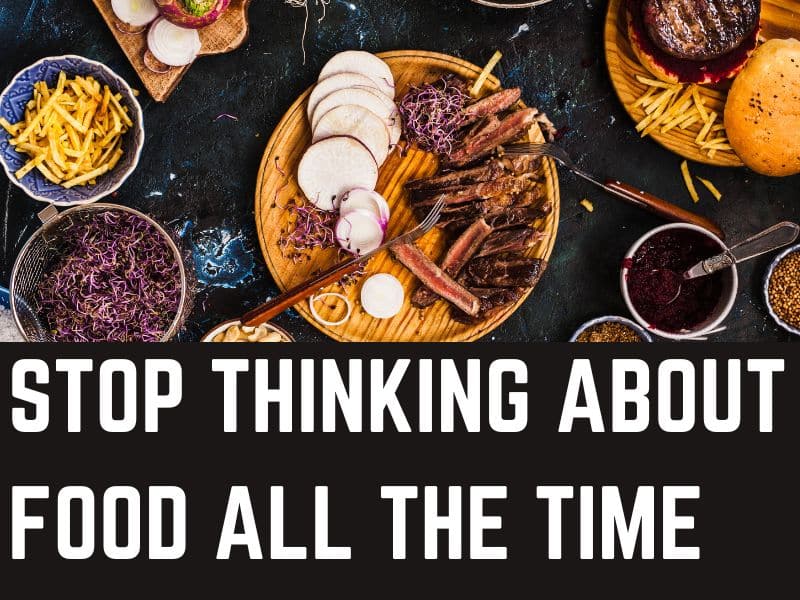Think about food is normal to an extent, but if you find yourself constantly daydreaming about meals, snacks, or specific cravings, you’re not alone. Many people experience persistent food thoughts for various reasons. In fact, constantly think about food can be linked to both physical and psychological factors that can affect daily life. From nutritional deficiencies to emotional eating, understanding why we have these food-focused thoughts can empower us to address them effectively.
In this article, we are going to discuss what could be the underlying reasons for your frequent thoughts about food, go over strategies on how to identify such obsessive thoughts and what you can do about them, and lastly, provide you with practical steps that can help you restore balance in your eating behavior.
Why Do I Constantly Think About Food? Top Reasons Explored
1. Biological Hunger and Nutritional Deficiencies
The craving which is often the reason behind food thoughts is quite predictable and that is hunger. When the gas tank of the body has less fuel in it, it ensures that there are hunger pangs reminding you of the need to eat. But not just hunger; there can be times when you may experience specific nutrient cravings due to being deficient in certain substances.
For example:
- Lack of Protein: Not eating enough protein can lead to persistent hunger and frequent food thoughts.
- Inadequate Fiber: Fiber helps to maintain satiety, so low fiber intake may increase cravings.
- Vitamin and Mineral Deficiencies: When our bodies lack essential vitamins, we may experience unusual food cravings or constantly think about food.
2. Restrictive Dieting and the “Forbidden Food” Effect
Sometimes food-related thoughts can become more intense, as is the case when someone is on a restrictive diet that bans whole food groups, including entire food types. There is a long-standing concept in the psychology of eating behaviors called the ‘the forbidden food’ that surfaces when such eating patterns exist, which explains the contradiction that occurs among people who tend to avoid eating certain items.
In such cases, all of their attention is geared towards the thought of the prohibited item. Consequently, the more someone perceives a particular food as restricted, the more they think about that food.
Tip: Instead of labeling foods as “good” or “bad,” adopting a balanced approach that includes a variety of foods can help minimize fixation on specific items.
3. Emotional and Stress-Related Eating
Emotions play a strong role in our diet. Stress, sorrow, boredom and even happiness can trigger desire. This sensitivity is consumed from the brain connection between food and rewards. When pressed, some people are leaning on high-calorie food because they release dopamine, a chemical that makes us feel good.
Examples of Emotional Triggers:
- Boredom: With nothing to do, food can provide temporary entertainment.
- Stress: High-stress situations can lead people to seek comfort in familiar foods, often high in sugar or fat.
- Loneliness: Eating can serve as a coping mechanism to alleviate feelings of loneliness.
4. Social Media and Food Advertising Influence
We live in the saturated world of food, advertising and social media posts, all of them keep food in our minds. Studies show that only food outlook can enhance aspirations and manage to think more about our eating. Platforms like Instagram and Facebook often have delicious -looking food pictures and videos that can trigger the desire to eat even if we are not hungry.
Tip: Limiting exposure to food-related content on social media can reduce the urge to snack and prevent unnecessary food thoughts.
5. Lack of Sleep and Its Effects on Hunger Hormones
Sleep deprivation can significantly affect your body’s hunger-controlled hormones, leptin and enclosure. Sneezing, often known as “hunger hormone”, grows with weak sleep, while leptin, responsible for satisfaction, decreases. This imbalance can increase hunger and constant think about food.
Solution: Prioritizing sleep can improve hormonal balance, help reduce unnecessary desires and diet busyness.
6. Habitual Snacking and Grazing
If you regularly snack yourself to the point of a brain annoyance level where food is nothing but a reward, you are likely to indulge in call it grazing which means nibbling on snacks throughout the day even if it is unnecessary.
Suggestion: Putting in practice regular meal and snack times may help you feel less hungry throughout the day and gradually your mind is programmed to not think about food all the time.
7. Underlying Psychological Conditions
Some psychological situations, such as anxiety, frustration or even abstract-meditative tendencies can lead to food-centered thoughts. These conditions can enhance the desire for comfortable food or lead to acute fixation on the food as a system of dealing.
Proposals: Food-related thoughts seeking assistance from mental health professionals can provide valuable strategies to derive from psychological situations.
How to Stop Thinking About Food All the Time: Practical Tips

1. Embrace Mindful Eating
Practicing footfall eating is one of the most effective ways to reduce food thinking. By focusing on the current moments, you can develop a more balanced relationship with food by focusing on hunger and fullness signals and enjoying each bite. This method encourages satisfaction and can reduce the urge to constantly think about food the next meal.
2. Create a Balanced Meal Plan
Eating a balanced diet, rich in nutrients, can prevent cravings and food preoccupations. Aim to include:
- Protein: Lean meats, eggs, tofu, and legumes to promote satiety.
- Complex Carbohydrates: Whole grains like quinoa and oats for lasting energy.
- Healthy Fats: Nuts, avocados, and olive oil to support satiety.
- Fiber-Rich Foods: Vegetables, fruits, and whole grains to keep you feeling full longer.
3. Address Emotional Eating with Healthy Outlets
Finding alternative ways to cope with emotions can significantly reduce food-related thoughts. Some strategies include:
- Exercise: Physical activity releases endorphins, which can improve mood.
- Meditation: Helps manage stress and increases awareness of emotional triggers.
- Hobbies: Finding a creative outlet like painting, writing, or gardening can provide a positive distraction from food thoughts.
4. Limit Social Media Exposure to Food Content
As mentioned earlier, constant exposure to food images and videos can contribute to food fixation. Unfollowing food-centric accounts or setting social media usage limits may reduce your urge to think about food all the time.
5. Stay Hydrated
Dehydration can sometimes be mistaken for hunger, leading to frequent food thoughts. Drinking enough water throughout the day can help differentiate between hunger and thirst, decreasing unnecessary cravings.
6. Get Sufficient Sleep
Ensuring quality sleep every night helps control your appetite hormones, reducing the chances of being food obsessed. Notice for 7-9 hours of sleep every night, as it can control the mood, energy level and food habits.
7. Seek Support if Needed
If persistent food thoughts interfere with daily life, consulting a nutritionist or therapist can be beneficial. A specialist can provide tailored strategies, tools, and guidance to address these thoughts and support a healthier relationship with food.
Final Thoughts: Finding Balance with Food
The urge to eat can be caused by different physiologic, psychological as well as environmental factors. Although some of these thoughts can be acceptable, an unreasonable preoccupation can interfere with the normal functioning of an individual and his or her well-being. If triggers such as stress, hunger or bad habits because of overthinking the root cause can be addressed efficiently. Refraining from emotional triggers, replacing unhealthy foods and eating habits and lifestyle may allow you to have a healthy and stress-free relationship with food.


